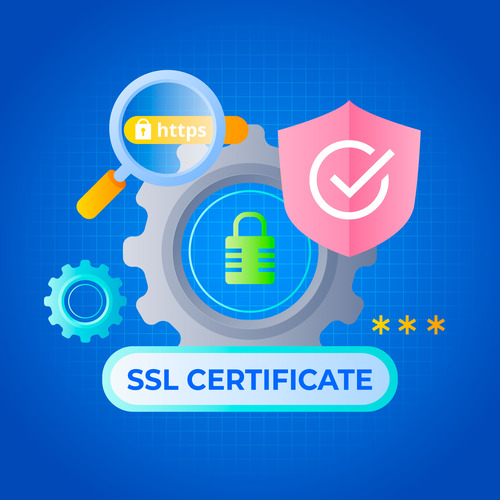- By Komal Sharma
- 2 Feb, 2025
- "SSL encryption" or "SEO benefits of SSL."
Why Every Website Needs an SSL Certificate
🔒 Is your website secure? In today's digital landscape, where cyber threats lurk around every corner, this question has never been more critical. Imagine losing your customers' trust—and potentially their sensitive data—simply because your website lacks a crucial security measure. That's where SSL certificates come in
SSL certificates are not just a fancy tech accessory; they're the backbone of online security and trust. From encrypting data to boosting your search engine rankings, these digital guardians play a pivotal role in safeguarding your online presence. But why exactly does every website need one? And how can it impact your SEO efforts?
In this post, we'll dive deep into the world of SSL certificates, exploring their benefits, importance, and SEO impact. We'll unravel the mysteries behind different types of SSL certificates, show you how to implement them, and reveal why they're no longer optional in today's competitive digital marketplace. 🚀 Get ready to discover how a simple security protocol can transform your website's performance and user trust!
"In a world where data breaches are the norm, SSL certificates stand as the guardians of online privacy. Secure your website today, because trust and security are the foundation of a successful digital presence."
Understanding SSL Certificates: Definition, Key Functions, and Importance for Website Security
A. Understanding SSL Certificates: Definition, Key Functions, and Importance for Website Security
SSL (Secure Sockets Layer) certificates are crucial components for establishing secure online environments. They create encrypted connections between servers and clients, ensuring data confidentiality and integrity. While SSL is widely recognized, it's important to note that the current standard is actually TLS (Transport Layer Security), which was developed as a successor to address vulnerabilities in SSLv3


The primary functions of SSL/TLS certificates include:
- 1. Data Encryption
- 2. Integrity Protection
- 3. Authentication
- 4. Visual Indicators (e.g., Padlock in Browser)
These certificates provide visual indicators in browsers, such as a green padlock, to signify a secure connection. However, users should be cautious as the mere presence of a padlock is insufficient to guarantee trust, given that many phishing sites also possess SSL certificates.
B. How SSL certificates work
The SSL/TLS protocol operates through a process known as the SSL handshake. This involves the use of public, private, and session keys to establish a secure connection. Here's a simplified breakdown of the process
- 1. Client initiates connection to server
- 2. Server sends its SSL certificate (containing public key)
- 3. Client verifies certificate authenticity
- 4. Client and server exchange session keys
- 5. Secure, encrypted communication begins
SSL/TLS relies on a public and private key system, which enhances security compared to traditional symmetrical key arrangements. The public key is used for encryption, while the private key is required for decryption, preventing unauthorized access even if the public key is exposed
C. Types of SSL certificates
SSL certificates come in various types, each serving different purposes and offering varying levels of validation
| Certificate Type | Validation Level | Key Features |
|---|---|---|
| Domain Validated (DV) | Basic | Quick issuance, suitable for small websites |
| Extended Validation (EV) | Highest | Rigorous validation, displays company name in browser |
| Wildcard | Varies | Secures multiple subdomains |
| Subject Alternative Name (SAN) | Varies | Covers multiple distinct domain names |
When selecting an SSL certificate, it's crucial to consider the specific needs of your website and the level of trust you want to establish with your users. Commercial certificates are generally preferred over self-signed certificates due to their widespread browser and operating system support.
With this understanding of SSL certificates, their functionality, and types, we can now explore the key benefits they offer to websites. In the next section, "Key Benefits of SSL Certificates," we'll delve into how these digital safeguards enhance security, build trust, and contribute to overall online business success.
Key Benefits of SSL Certificates
Now that we have covered the basics of SSL certificates, let's delve into their key benefits. SSL certificates offer several advantages that make them essential for any website.
Data encryption and security
SSL certificates play a crucial role in safeguarding sensitive information. They encrypt data during transmission, making it virtually impossible for hackers to intercept and decipher. This encryption is particularly vital for websites handling:
- Login credentials
- Payment information
- Personal identifiers




